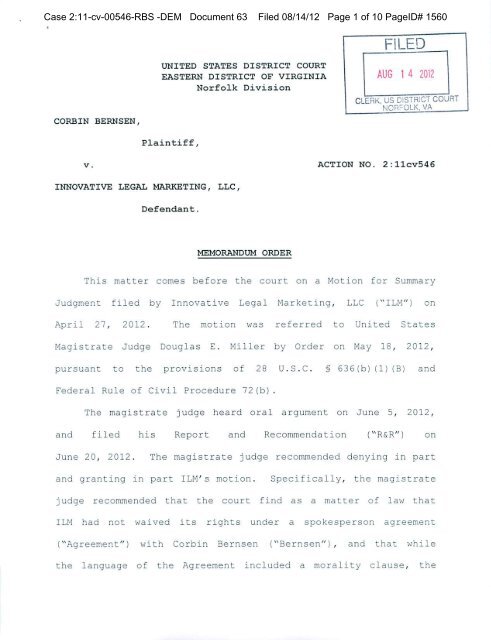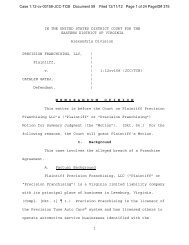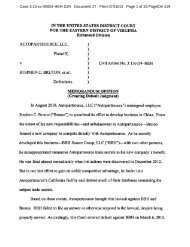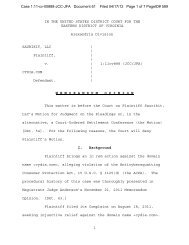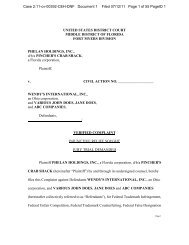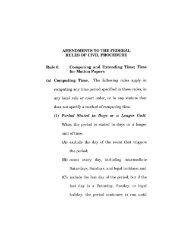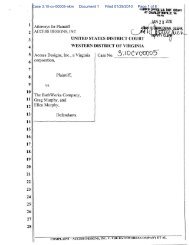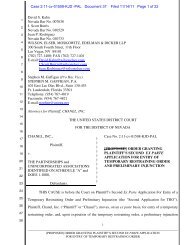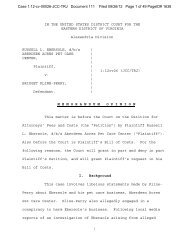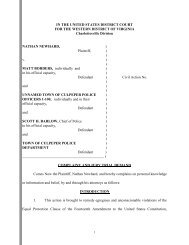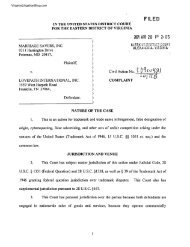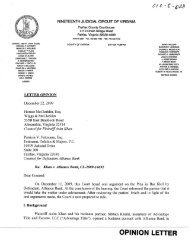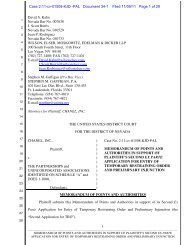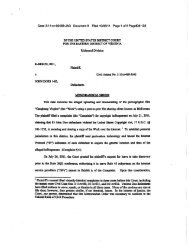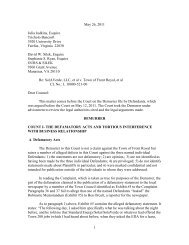Case 2:11-cv-00546-RBS - Virginia Business Litigation Lawyer Blog
Case 2:11-cv-00546-RBS - Virginia Business Litigation Lawyer Blog
Case 2:11-cv-00546-RBS - Virginia Business Litigation Lawyer Blog
You also want an ePaper? Increase the reach of your titles
YUMPU automatically turns print PDFs into web optimized ePapers that Google loves.
<strong>Case</strong> 2:<strong>11</strong>-<strong>cv</strong>-<strong>00546</strong>-<strong>RBS</strong> -DEM Document 63 Filed 08/14/12 Page 1 of 10 PageID# 1560FILEDUNITED STATES DISTRICT COURTEASTERN DISTRICT OF VIRGINIANorfolk DivisionAUG 1 4 2012CLERK, US DISTRICT COURTNORFOLK, VACORBINBERNSEN,Plaintiff,v. ACTION NO. 2:ll<strong>cv</strong>546INNOVATIVE LEGAL MARKETING, LLC,Defendant.MEMORANDUMORDERThis matter comes before the court on a Motion for SummaryJudgment filed by Innovative Legal Marketing, LLC ("ILM") onApril 27, 2012. The motion was referred to United StatesMagistrate Judge Douglas E. Miller by Order on May 18, 2012,pursuant to the provisions of 28 U.S.C. § 636(b)fl)(B) andFederal Rule of Civil Procedure 72(b).The magistrate judge heard oral argument on June 5, 2012,and filed his Report and Recommendation ("R&R") onJune 20, 2012. The magistrate j udge recommended denying in partand granting in part ILM's motion. Specifically, the magistratej udge recommended that the court find as a matter of law thatILM had not waived its rights under a spokesperson agreement("Agreement") with Corbin Bernsen ("Bernsen"), and that whilethe language of the Agreement included a morality clause, the
<strong>Case</strong> 2:<strong>11</strong>-<strong>cv</strong>-<strong>00546</strong>-<strong>RBS</strong> -DEM Document 63 Filed 08/14/12 Page 2 of 10 PageID# 1561court should deny ILM's motion as to Bernsen's alleged breach ofthat clause. R&R 23-24. The magistrate judge furtherrecommended that the court grant ILM's motion on Bernsen's claimfor unjust enrichment and dismiss that claim. Id. By copy ofthe R&R, the parties were advised of their right to file writtenobjections thereto. On July 5, 2012, the court receivedPlaintiff's Objection to Magistrate Judge Miller's June 20, 2012Report & Recommendation ("Bernsen's Objection"). ILM filed itsResponse on July 19, 2012.Pursuant to Rule 72(b) of the Federal Rules of CivilProcedure, the court, having reviewed the record in itsentirety, shall make a de_ novo determination of those portionsof the R&R to which Bernsen has specifically objected. Fed. R.Civ. P. 72(b). The court may accept, reject, or modify, inwhole or in part, the recommendation of the magistrate judge, orrecommit the matter to him with instructions. 28 U.S.C.§ 636(b)(1).The court, having examined Bernsen's Objection and havingmade de novo findings with respect thereto, sustains Bernsen'sObjection. Accordingly, the findings and recommendations setforth in the R&R are adopted in part and modified in part, andILM's Motion for Summary Judgment is GRANTED IN PART and DENIEDIN PART. At a threshold level, however, in making thisdetermination on ILM's Motion for Summary Judgment, the court
<strong>Case</strong> 2:<strong>11</strong>-<strong>cv</strong>-<strong>00546</strong>-<strong>RBS</strong> -DEM Document 63 Filed 08/14/12 Page 3 of 10 PageID# 1562ADOPTS the recommended findings of undisputed material fact setforth in the R&R.1I. Summary Judgment: StandardSummary judgment under Rule 56 is appropriate when thecourt, viewing the record as a whole and in the light mostfavorable to the nonmoving party, finds there is no genuineissue of material fact and that the moving party is entitled tojudgment as a matter of law. Anderson v. Liberty Lobby, Inc.,477 U.S. 242, 248-50 (1986). A court should grant summaryjudgment if the nonmoving party, after adequate time fordiscovery, has failed to establish the existence of an essentialelement of that party's case, on which that party will bear theburden of proof at trial. Celotex Corp. v. Catrett, 477 U.S.317, 323 (1986).To defeat a motion for summary judgment, the nonmovingparty must go beyond the facts alleged in the pleadings, insteadrelying upon affidavits, depositions, or other evidence to showa genuine issue for trial. See id. at 324. Conclusorystatements, without specific evidentiary support, areinsufficient. Causey v. Balog, 162 F.3d 795, 802 (4th Cir.1998) . Rather, "there must be evidence on which the jury couldreasonably find for the plaintiff." Anderson, 477 U.S. at 252.1 See R&R 2-8.
<strong>Case</strong> 2:<strong>11</strong>-<strong>cv</strong>-<strong>00546</strong>-<strong>RBS</strong> -DEM Document 63 Filed 08/14/12 Page 4 of 10 PageID# 1563II. Bernsen's ObjectionBernsen raises one objection to the R&R, contesting themagistrate judge's finding as a matter of law that ILM has notwaived its rights to terminate the Agreement based on anyalleged violation of the morality clause. For the reasons setforth below, the court sustains Bernsen's Objection.A. R&R RecommendationBernsen objects to the finding in the R&R that, as a matterof law, "ILM has not waived its rights under the contract."Bernsen's Obj. 1. Bernsen argues that a party may waive ananti-waiver provision by its conduct, and thus whether ILMwaived its right to terminate the agreement for the allegedviolations of the morality clause of the Agreement raises a juryquestion. Id. at 2-3. ILM contends in its Response that,"[w]hile Bernsen is correct that a non-waiver clause cantheoretically be waived, he has failed to put forth any evidenceto support the waiver of the non-waiver clause." ILM's Resp. 1.Section C(l) of the R&R addressed Bernsen's allegation"that ILM waived its right to terminate the Agreement forviolations of the morality clause as the company knew about hisconduct for some time prior to terminating him." R&R 9. Asboth parties agree, the Agreement contains an unambiguous antiwaiverprovision. See Bernsen's Obj. 1; ILM's Resp. 1.Examining <strong>Virginia</strong> Elec. & Power Co. v. Norfolk S. Ry. Co., 278
<strong>Case</strong> 2:<strong>11</strong>-<strong>cv</strong>-<strong>00546</strong>-<strong>RBS</strong> -DEM Document 63 Filed 08/14/12 Page 5 of 10 PageID# 1564Va. 444 (2009), the magistrate judge stated that, under <strong>Virginia</strong>law, an anti-waiver provision "did not preclude the defendantfrom enforcing the terms of the agreement even though it had notdone so previously." R&R 10.2 Given that the Agreement in thiscase similarly has an anti-waiver provision, the magistratejudge concluded "simply because ILM knew of Bernsen's conductprior to his termination does not give rise to a waiver of itsrights under the terms of the Agreement." Id.B. Waiver of an Anti-Waiver ProvisionWaiver "is the voluntary, intentional abandonment of aknown legal right. It has two essential elements: (1) knowledge2 The court does not find <strong>Virginia</strong> Electric to be controlling onthe issue of waiver in the instant case. In <strong>Virginia</strong> Electric,the <strong>Virginia</strong> Supreme Court upheld a circuit court's rulingstriking an affirmative defense of waiver because "the elementsof judicial estoppel were established in this case." <strong>Virginia</strong>Elec. & Power Co., 278 Va. at 466. The <strong>Virginia</strong> Supreme Courtdid not address alternative grounds for striking the defense ofwaiver. Id. As the dissent highlighted, if the <strong>Virginia</strong>Supreme Court had not found the waiver defense precluded byjudicial estoppel, the plaintiff had alleged a viableaffirmative defense, because "a party may waive a non-waiverprovision of a contract such as the one contained in thecontract in this case," including "by conduct, acts, or courseof dealing." Id. at 476-77 (Koontz, J., dissenting). Thus,absent judicial estoppel, the plaintiff in <strong>Virginia</strong> Electricwould have had the chance to prove waiver to "the trier offact." Id. In the instant case, judicial estoppel is not anissue, and thus waiver is a viable affirmative defense to bedeveloped for the trier of fact. <strong>Virginia</strong> Electric is otherwisedistinguishable on a factual basis from the instant case, as,after failing to assert a contractual right for a period oftime, defendant Norfolk Southern prospectively advised theplaintiff that it would reassert its contractual right, and thecourt only calculated damages from the time of prospectivenotice forward. Id. at 522, 533.
<strong>Case</strong> 2:<strong>11</strong>-<strong>cv</strong>-<strong>00546</strong>-<strong>RBS</strong> -DEM Document 63 Filed 08/14/12 Page 6 of 10 PageID# 1565of the facts basic to the exercise of the right, and (2) theintent to relinquish that right." Bergmueller v. Minnick, 383S.E.2d 722, 725 (Va. 1989).3 "Waiver need not be express: it maybe inferred from the conduct of the waiving party." Perry Enq'gCo. v. AT&T Comm'cns, Inc., No. 92-2050, 1993 U.S. App. LEXIS17432, at *13 (4th Cir. July 13, 1993) (citing Woodmen of WorldLife Ins. Soc'y v. Grant, 38 S.E.2d 450, 454 {Va. 1946)). Theexistence of an anti-waiver clause in a contract is evidence ofan intent not to relinquish the rights under the contract;however, "it does not necessarily control," because, "[l]ike allcontractual rights, the rights under the 'no waiver' clause arethemselves subject to waiver." Id. at *14. Such waiver can beshown "by conduct, acts, or a course of dealing." Woodmen ofWorld, 38 S.E.2d at 454.Here, there appears to be no dispute that ILM knew of someof the alleged incidents at issue "for months, and even years,"prior to the decision to terminate the Agreement. Bernsen'sObj. 3. The question of waiver thus turns on whether there is amaterial dispute as to ILM's intent to relinquish itscontractual right. Bernsen points to three pieces of evidence3 The statement in the R&R that "simply because ILM knew ofBernsen's conduct prior to his termination does not give rise toa waiver of its rights under the terms of the Agreement,"R&R 10, is thus insufficient; the court must then examinewhether a genuine dispute of material fact exists as to ILM'sintent.
<strong>Case</strong> 2:<strong>11</strong>-<strong>cv</strong>-<strong>00546</strong>-<strong>RBS</strong> -DEM Document 63 Filed 08/14/12 Page 7 of 10 PageID# 1566as creating a jury question as to ILM's intent to waive: "(1)ILM continued to use Bernsen for almost two years [after thepotentially violative conduct]; (2) ILM continued to pay Bernsenunder the Agreement; and (3) ILM continued to reap the benefitof the use of Bernsen in its advertisements by collectingpayments from its customers." Id. at 4. ILM does not contestthis evidence, but characterizes it as insufficient, statingthat the "conduct by ILM is entirely consistent with itsbargained-for contractual right of non-waiver. . . . The conductis entirely consistent with a party who knows its rights areprotected by a non-waiver provision." ILM's Resp. 3.The court finds both parties' characterizations plausible.ILM's continued use of Bernsen, continued payment under theAgreement, and continued enjoyment of the benefits of Bernsen'sendorsement may be consistent with a party exercising itsbargained-for contractual right of non-waiver. However,continuation of use, payment, and enjoyment under a contractafter five separate incidents potentially violative of thecontract's morality clause, see R&R 4-6, is also a course ofconduct entirely consistent with an affirmative intent by ILM towaive its right to subsequently enforce the morality clause.Other courts have similarly found that repeated declination toenforce a clause in a contract can evidence intent to waive theprovision, notwithstanding an anti-waiver provision. See Perry
<strong>Case</strong> 2:<strong>11</strong>-<strong>cv</strong>-<strong>00546</strong>-<strong>RBS</strong> -DEM Document 63 Filed 08/14/12 Page 8 of 10 PageID# 1567Eng'g Co., 1993 U.S. App. LEXIS 17432, at *14 ("One could inferfrom AT&T's consistent practice of approving price adjustmentssubmitted after ten days had elapsed that it intended to waivethe ten-day deadline in all cases."). See generally Woodmen ofWorld, 38 S.E.2d at 454 (holding that a party's intent to waivecan be evidenced "by conduct, acts, or a course of dealing").Even the case cited by ILM in support of its position in itsResponse makes this point. See Olga's Kitchen v. Papo, No. 85-1591, 1987 U.S. App. LEXIS 2205, at *12 (6th Cir. Feb. 16, 1987)(unpublished) ("A lessor may waive a ^nonwaiver' clause in alease agreement by a persistent course of conduct in acceptinglatepayments.").At this stage in the litigation, the court must draw "allreasonable inferences in favor of the non-moving party." Reevesv. Sanderson Plumbing Prods., Inc., 530 U.S. 133, 150 (2000).Viewing the evidence in that light, the court concludes that ajury could find that the evidence of ILM's continued payment anduse of Bernsen's endorsement after repeated incidentspotentially violative of the morality clause in the Agreementdemonstrate ILM's intent to waive its anti-waiver provision withrespect to that clause.4 Similarly, numerous other courts have4 ILM argues that implied waiver must be demonstrated by "clearand convincing evidence," and that Bernsen cannot meet thisburden. ILM's Resp. 3. However, "at the summary judgment stagethe judge's function is not himself to weigh the evidence and8
<strong>Case</strong> 2:<strong>11</strong>-<strong>cv</strong>-<strong>00546</strong>-<strong>RBS</strong> -DEM Document 63 Filed 08/14/12 Page 9 of 10 PageID# 1568held that waiver, even of an anti-waiver provision, is usually aquestion best left to the jury. See Link Assocs. v. JeffersonStandard Life Ins. Co., 223 Va. 479, 485 (1982) (noting thatproof of waiver is "usually a question for the trier of fact") ;see also Westinghouse Credit Corp. v. Shelton, 645 F.2d 869, 872(10th Cir. 1981) ("[T]he weight of authority ... is that an'anti-waiver' clause, like any other terra in the contract, isitself subject to waiver or modification by course ofperformance and that whether such waiver or modification hasoccurred is a question for the factfinder.").Given the court's recognition of two potentially valid andcontradictory interpretations of the submitted evidence as itrelates to ILM's intent, and thus waiver, the court declines tofind that ILM is entitled to judgment as a matter of law. Assuch, the court DENIES ILM's Motion for Summary Judgment as toBernsen's alleged breach of the morality clause.Ill.ConclusionThe court, having examined Bernsen's Objection to the R&R,and having reviewed the record and made cte novo findings withdetermine the truth of the matter but to determine whether thereis a genuine issue for trial." Anderson, 477 U.S. at 249.Drawing all reasonable inferences in Bernsen's favor, the courtfinds that Bernsen has presented sufficient evidence on theissue of intent to make, it a genuine issue for trial, as thejury will be instructed on the clear and convincing standard andwill need to determine whether Bernsen's evidence rises to thatlevel.
<strong>Case</strong> 2:<strong>11</strong>-<strong>cv</strong>-<strong>00546</strong>-<strong>RBS</strong> -DEM Document 63 Filed 08/14/12 Page 10 of 10 PageID# 1569respect to the portion objected to, does hereby adopt andapprove the findings and recommendations set forth in Sections Aand C(2]-(5) of the R&R, concerning the morality clause in theAgreement and dismissal of Bernsen's unjust enrichment claim.The court does hereby modify the findings and recommendationsset forth in Section C(l) of the R&R, concerning a conclusion oflaw on ILM's potential waiver of its rights under the Agreement,as discussed above.Accordingly, ILM's Motion for Summary Judgment is GRANTEDin part and DENIED in part. The court finds as a matter of lawthat the language of the Agreement includes a morality clause;however, the court declines to find as a matter of law that ILMhas not waived its rights under the Agreement, because amaterial fact remains in dispute, namely ILM's intent to waive.The court DENIES ILM's motion as to Bernsen's alleged breach ofthe morality clause, because material facts remain in disputeconcerning Bernsen's conduct and waiver. Finally, the courtGRANTS ILM's motion on Bernsen's claim for unjust enrichment,and DISMISSES that claim. The Clerk is DIRECTED to forward acopy of this Order to counsel for all parties.Norfolk,([it is so ordered. Rebecca Beach SmithChiefUnited States District Judge<strong>Virginia</strong>August ^a , 2012REBECCA BEACH SMITHCHIEF UNITED STATES DISTRICT JUDGE10


